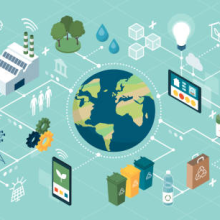10 Easy Ways to Make Your Home Eco-Friendly: How To Make Your Home Green?
Going green has never been easier thanks to the abundance of eco-friendly products and ideas available today.
Not only are eco-friendly products better for the environment, but they can also save you money in the long run.
Making your home green and eco-friendly doesn’t have to be a daunting task.
With just a few simple changes, you can reduce your carbon footprint and make your home eco-friendly and energy efficient.
From switching out lightbulbs to using natural cleaning products.
Meanwhile, check the Eco-Friendly Ideas and Simple Tips to Think Green Around the Home here
Here are 10 easy ways to make your home more eco-friendly and help reduce your carbon footprint.

1. Use energy-efficient light bulbs to reduce electricity consumption
One of the easiest ways to make your home eco-friendly and more green is to use energy-efficient light bulbs.
These bulbs use up to 80% less electricity than traditional incandescent bulbs and last up to 25 times longer.
They are designed to produce the same amount of light but with far less energy consumption, which in turn will save you money on your energy bills over time.
Not only do they help reduce electricity consumption, but they also emit less heat, making them safer and cooler to use.
Consider replacing all your lighting fixtures with energy-efficient bulbs and do your part in contributing to a more sustainable future.
2. Install low-flow showerheads and faucets to conserve water
In order to make your home more eco-friendly, there are a number of simple steps you can take. One of the easiest and most effective ways to reduce your environmental impact is to install low-flow showerheads and faucets.
These devices can significantly reduce the amount of water you use in your home. They work by limiting the amount of water that flows through your pipes and fittings, without sacrificing water pressure or quality.
By conserving water in this way, you’ll not only be reducing your household’s water footprint, but also saving on water bills.
Making small changes like this can have a big impact in the long run, and can help to make your home more green and eco-friendly.
3. Invest in renewable energy sources such as solar panels and wind turbines
Investing in renewable energy sources such as solar panels and wind turbines is a great way to make your home eco-friendly and green.
Solar panels and wind turbines harness the power of nature to provide a clean and uninterrupted stream of energy, which significantly reduces reliance on fossil fuels.
This means not only low electricity bills but also a sustainable solution to energy generation that can benefit the environment. Installing solar panels and wind turbines might seem expensive at first, but the long-term benefits make it a worthwhile investment.
In addition, government incentives are available to encourage the installation of renewable energy sources, making it even more cost-effective.
With a little research, you can find out the most suitable renewable energy source for your home based on your needs, budget, and location.
4. Use eco-friendly cleaning products to minimize the use of chemicals in your home
One of the simplest ways to make your home eco-friendly is by using eco-friendly cleaning products. These products minimize the use of chemicals in your home, which is beneficial for both your health and the environment.
Eco-friendly cleaning products are made from natural or renewable resources and reduce the levels of toxic materials and pollutants.
Additionally, they come in recyclable packaging, which makes them a more sustainable choice. By using eco-friendly cleaning products, you can reduce the amount of harmful chemicals released into the environment and create a healthier living space.
By making this simple switch to eco-friendly cleaning products, you can easily make your home green and contribute to a more sustainable future.
5. Recycle and compost household waste to reduce your carbon footprint.
Recycling and composting your household waste are effective measures you can adopt to make your home eco-friendly or green.
Recycling is the best way to reduce the amount of waste that ends up in landfills, which would produce greenhouse gases and contribute to climate change.
By recycling, you make fewer items that take hundreds of years to decompose and contribute to the pollution of the environment.
Composting is another way to reduce waste and create useful organic fertilizer for your home garden.
With a compost bin, you can recycle your organic waste into nutrients for your flowers, fruits, and vegetables.
When you compost and recycle, you contribute to a more sustainable and carbon-neutral way of living, positively impacting the planet and future generations.
Conclusion
In conclusion, it’s clear that making your home eco-friendly doesn’t require major renovations or huge investments. Implementing the tips mentioned above can help reduce waste, cut energy consumption, and ultimately save money.
From using natural cleaning products to installing energy-efficient light bulbs, every small change can make a big difference in preserving the planet.
With these easy and practical ways, we can all contribute to building a more sustainable future for generations to come.
Here are some reputable websites that can provide further information on How To Make Your Home Green:
- Energy.gov: https://www.energy.gov/articles/10-easy-ways-save-energy-home
- EPA.gov: https://www.epa.gov/greenhomes/10-easy-steps-green-your-home
- Greenpeace.org: https://www.greenpeace.org/usa/green-living/10-easy-ways-to-green-your-home/
- NRDC.org: https://www.nrdc.org/stories/10-ways-make-your-home-more-eco-friendly
- The Spruce: https://www.thespruce.com/easy-ways-to-make-your-home-more-eco-friendly-4683845
These websites provide useful information and tips on how to make your home more eco-friendly, and are considered reputable sources for information on environmental topics.


